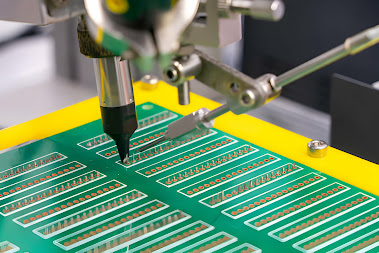12 Essential Tips For Sourcing & Producing PCBs
1. Do your research and find a reputable PCB manufacturing company.
There are many PCB manufacturers out there, so do your research and find one that fits your specific needs. Make sure to read current feedback and reviews before comparing pricing and making your decision.
2. Provide the manufacturer with all necessary information.
When you contact a manufacturer, be sure to provide them with all the necessary information, including your design files, exact specifications, and any other requirements you may have. This will help ensure that your PCBs are made to the correct spec and that they’ll meet your expectations.
3. Plan ahead and allow enough time for manufacturing.
It can take time to manufacture PCBs, and this time may be extended depending on your job spec. Be sure to plan ahead and allow enough time for production. You don't want to have to halt your production line whilst you’re waiting for your PCBs to be manufactured!
4. Discuss the design brief thoroughly with your manufacturer.
Discussing your design brief with your PCB manufacturing company will help identify any problems before they arise, thereby avoiding costly mistakes which will result in delays. Whilst some manufacturers have strict policies, others are more flexible so it is important that you know which one will work best for you.
5. To ensure accuracy, double check all files before sending to your PCB manufacturing company
Before sending your files off, thoroughly examine everything to ensure accuracy—any mistakes made at this point could affect the quality of the finished product, so it's crucial that you catch anything that’s wrong, or missing, before submitting your files.
6. Verify the manufacturer's capabilities and make sure they can meet your specific needs.
Not all PCB manufacturers are created equally, so it's important to verify the manufacturer's capabilities and make sure they can meet your specific needs. For example, if you need a prototype made quickly, be sure to find a manufacturer who offers rapid services.
7. Get an estimate for manufacturing costs before placing your order.
PCB manufacturing can be expensive, so it's important to get an accurate estimate for manufacturing costs before placing your order. This will help you budget accordingly and avoid any surprises down the road.
8. Check the delivery time estimate of your PCBs.
Once your PCBs are manufactured, you'll need to check delivery times to find out when they will be shipped to you. This will help you plan for their arrival and ensure that you have enough time to test them out and incorporate them into your project.
9. Inspect the finished product and make sure everything is as expected.
Once you receive your PCBs, it's important to inspect them and make sure everything is as expected. If there are any problems, contact the manufacturer immediately so they can correct any issues.
10. Follow the manufacturer's instructions exactly when it comes to storage and handling of PCBs.
To ensure that your PCBs remain in the best possible condition, be sure to follow the manufacturer's instructions for correct storage and handling. This includes keeping them in a dry environment and avoiding excessive temperatures.
11. Use PCBs for their intended purpose, as stated by the manufacturer.
Not every PCB will be suitable for all applications, so it's important to use them appropriately and within the manufacturer's specifications. If you exceed limitations, you could damage them and void their warranty.
12. Have a backup plan in case any issues arise.
Things do occasionally go wrong, so it's always a prudent idea to have a backup plan in case of any problems arising with your PCBs. This may include ordering extra PCBs, or drawing up a contingency plan in the case of something going wrong.

Comments
Post a Comment